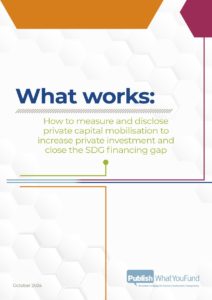Mobilisation transparency
What works: How to measure and disclose private capital mobilisation to increase private investment and close the SDG financing gap
 This programme aims to create an improved mobilisation reporting approach for leading multilateral development banks (MDBs) and development finance institutions (DFIs) to increase understanding around what works to mobilise private investment. Through a collaborative effort with leading DFIs and other key stakeholders, we propose a way forward for investment level reporting of mobilisation data. We hope to help to steer what greater transparency looks like and incentivise a sector-wide shift in practices over the coming years.
This programme aims to create an improved mobilisation reporting approach for leading multilateral development banks (MDBs) and development finance institutions (DFIs) to increase understanding around what works to mobilise private investment. Through a collaborative effort with leading DFIs and other key stakeholders, we propose a way forward for investment level reporting of mobilisation data. We hope to help to steer what greater transparency looks like and incentivise a sector-wide shift in practices over the coming years.
The challenge
Today’s global needs are unprecedented, fuelled by food insecurity, conflicts, poverty, and a worsening climate – all exacerbated by the COVID-19 pandemic and the struggle to recover. More resources from both the public and private sector are urgently required if we are to reach the scale of SDG finance needed to meet global needs. Multilateral development banks (MDBs) and development finance institutions (DFIS) have a critical role in not only increasing their own investments, but also in mobilising private capital.
Current levels of private capital mobilisation (PCM), however, are underwhelming and off track to meet global needs.
Two of the main challenges to significantly scaling PCM are:
- the need to agree on consistent, harmonised measurement of PCM that properly aligns measurement to incentives
- the need for disaggregated investment data that provides the private sector with the information it needs and to allow stakeholders information to ensure effective accountability.
Without an approach that both measures newer, more innovative instruments and provides granular data, DFIs – and other stakeholders – have no opportunity to know what is effective for increasing PCM. The learnings that could be shared are lost, leaving DFIs with insufficient information to ensure they are investing in a way that maximises the ability to scale. Information that enables the private sector to learn and engage in co-investment is likewise lost. In addition, without this robust data, shareholders cannot adequately perform their oversight function.
Our work
The overall goal of this programme is to expand MDB lending capacity by increasing private capital mobilisation of non-DFI resources for achieving the SDGs, climate targets and gender equality goals. We hope to achieve this by increasing understanding around what works to mobilise private investment by proposing improvements to mobilisation reporting practises.
Publish What You Fund has adopted a collaborative, multi-stakeholder approach that seeks to identify the central issues in measuring and disclosing mobilisation data. We have been analysing, researching, and consulting with a range of stakeholders to identify and agree a way forward. In April 2024, we published a draft proposal in the ‘Crowding In’ report. Following the launch, we undertook an extensive public comment period with DFIs, experts, and shareholders, and conducted more in-depth research into private sector information needs, with a specific focus on commercial confidentiality and our proposal that investors be identified by typology. In October 2024, we published our final recommendations in the ‘What Works’ report.
Download What Works (full report)
Download What Works (executive summary)
Our recommendations
Our recommendations build on the existing MDB and OECD approaches and set out the improvements needed to ensure accountability, learning – and ultimately – to increase the scale of mobilisation.
We have defined a consistent methodology for measuring mobilisation that accurately captures the broad range of activities across timelines and aligns with incentives to prioritise the most promising kinds of investments.
Critically, we call for detailed, disaggregated disclosure, which is crucial for scaling PCM. Our research and consultations, especially those after the release of our ‘Crowding In’ report, provide solid evidence that our proposal for disclosure is achievable, in line with market standards, and reflects the type of information readily available on third party sites. Claims of commercial confidentiality are not only overused but are also contradicted by many in the private sector who support our disclosure proposal, including the identification of the mobilised party by typology. Further, the lack of disaggregated data discourages private sector investment, as critical missing information increases market inefficiencies and the cost of doing business with DFIs.
To truly understand what works and where, it is vital that we see disaggregated and granular PCM data, including transparency of investment, instrument, country, sector, mobilisation type, amounts mobilised, and the typology of the mobilised party. The blanket presumption of confidentiality relating to PCM data must change to a presumption of disclosure, with exceptions only where legitimate confidentiality concerns exist.
Our funders
This project is funded by the MDB Challenge Fund. The MDB Challenge Fund is administered by New Venture Fund and supported by grants from the Gates Foundation, Open Society Foundations and the Rockefeller Foundation.
Watch the launch
Watch the launch of the ‘What Works’ report below.

